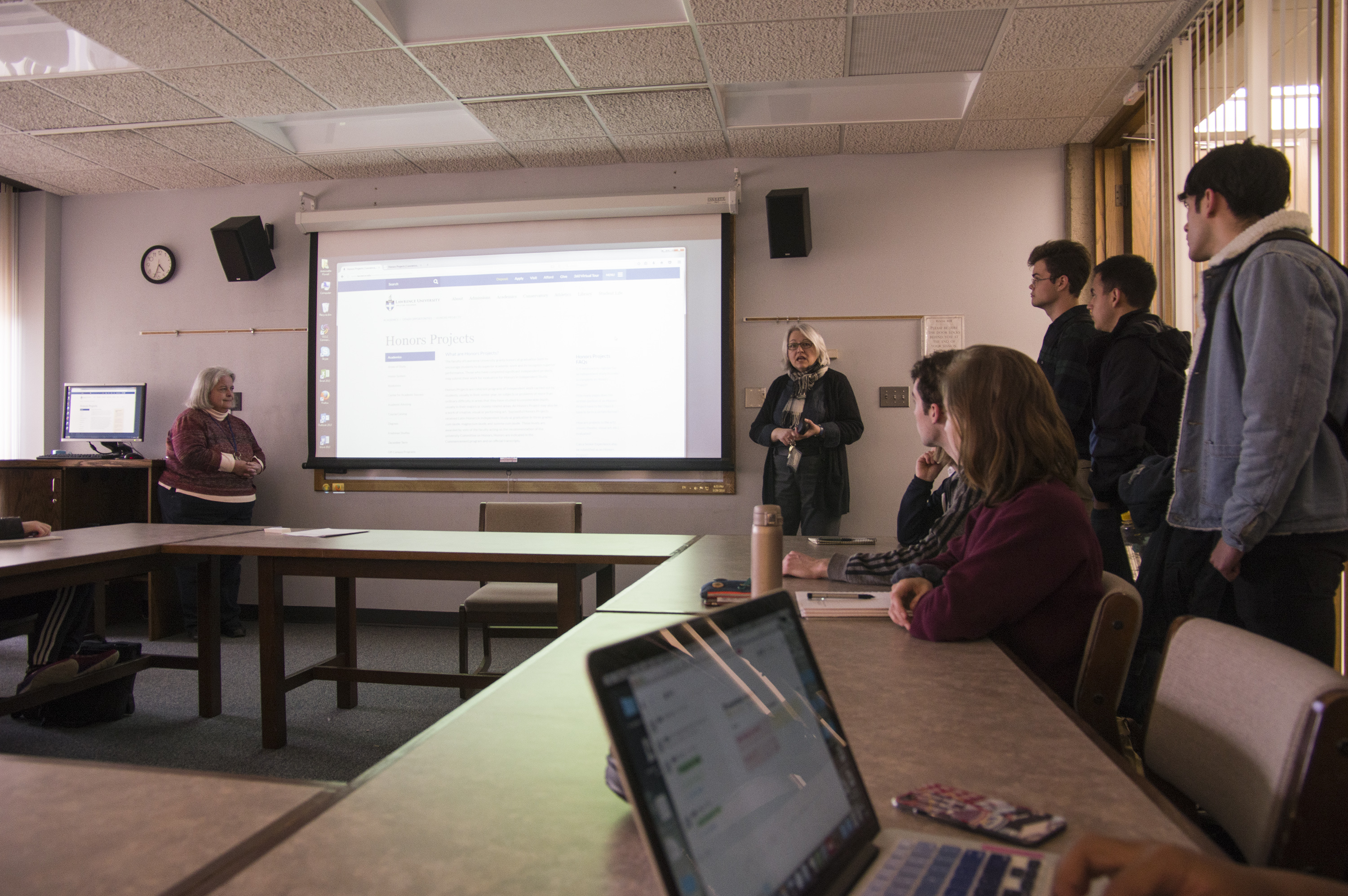Professor Antoinette Powell explains the Honors Project to students.
Photo by Billy Liu.
In one small library room, several dozen students crowded in and craned their necks to listen to Music Librarian and Assistant Professor Antoinette Powell explain the ins and outs of completing the Honors Project. Powell described the prestigious project as “extra academic work that is undertaken by a student in order to add to the knowledge of that subject and also to sharpen research skills and to demonstrate knowledge of that subject personally.” Juniors can choose to begin an independent study — which in the case of an honors project, does not have to be registered on Voyager — in the summer before a chosen term of senior year in which the project will be reviewed and the student will defend their thesis.
These independent studies can involve labs, literary analysis, or anything pertaining to an area of study which the student wishes to shed light on. The absolute latest the project can be turned in is during the sixth week of the term, as a great deal must be done to assess the project before graduation. Powell said, “If you’re successful in defending your honors project, you receive Latin honors at graduation.” So what exactly is the process of receiving these honors?
First, an examining committee will assess the project. The student must present a thesis defense to an audience consisting of their project advisor, (generally a professor in the subject being studied), another person from within the discipline and someone with no experience of the subject which is being discussed. Powell emphasized the importance of this “outside” person as someone to help approach the project from a different angle. “It’s up to you to explain to someone who has no clue; it’s very enlightening,” Powell explained.
Once the thesis has been defended, the honors committee meets to discuss with the examining committee over whether the defendant will receive honors on their project. This result will not be revealed to the student until graduation. Along with the prestigious title which one earns upon graduating with honors, completing an honors project allows one to contribute in a very real way to scholarship regarding their subject of interest. If one visits LUX, the Lawrence University Institutional Repository at https://lux.lawrence.edu/ and selects “Lawrence University Honors Projects,” a large selection of previous honors projects by Lawrence students can be viewed and downloaded for real research. A map at the bottom of the page even provides fascinating real-time data on who is downloading what articles from all over the world.
The LUX website as well as the Honors Project home page were projected before the student audience’s eyes as Antoinette Powell explained the mechanics of the Honors Project. Reference Librarian and Instruction Coordinator and Assistant Professor Gretchen Revie as well as Interlibrary Loan Coordinator and Assistant Circulation Services Supervisor Andrew McSorley also spoke to those present about services available to students completing the honors project, namely the reference librarians’ expertise and the benefits of Interlibrary Loan.
Revie encouraged students to take advantage of the research appointments available through the link on the Seeley G Mudd library’s homepage, reminding the audience not to “waste that precious time tracking down sources” when the reference librarians are ready and willing to help. Revie also reminded students of the Center for Academic Success (CAS) which is a valuable source for proofreading the substantial honors papers.
The reference librarians are eager to help out in any way possible, as Revie attested to, saying, “we are willing to help people with anything from very basic questions that help back, fill and support the research which they are doing, all the way to helping them make sure that they’ve got things cited correctly. We’re there for any part of the process and our basic focus is to help people save time so that they can concentrate on the work that only they can do in terms of thinking about an idea.”
Andrew McSorley addressed use of Interlibrary Loan (ILL). While McSorley maintained that ILL “is a good first stop if there’s a material you can’t find,” it should not be a last minute resort, as the loan program must wait for materials to be mailed from other libraries it is borrowing from. Students shouldn’t be afraid to ask for anything, as McSorley made clear in an example in which the ILL program had had to locate CD liner notes for a Professor. “It’s worth it just to ask,” the Interlibrary Loan Coordinator stressed.
Powell had several remarks about her specific role in the Honors Project process. The music librarian takes on several responsibilities, which she listed as “mak[ing] sure that things just keep coming along, that faculty know when they have to choose examining committee members, that students know what the deadlines are and … that the honors committee meets to decide who will take which exams.” Revie added, “I also answer a lot of questions from students too, because obviously they’ve never done this before because you get one shot at doing the Honors Project here at Lawrence.”
The Honors Project presents Lawrence students with the opportunity to show mastery of novel ideas in any subject of their choosing. A project of this magnitude may be a daunting task, but Honors Roundtable meetings such as this offer students assistance and the chance to better understand what they are embarking on. Be on the lookout for these roundtables at the beginning of Fall, Winter and Spring terms of next year.

